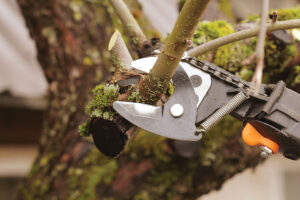Cicada killers are fascinating creatures. The larger docile female is equipped with a stinger but avoids using it unless there’s a cicada. The smaller more territorial male doesn’t have a stinger. He’s all bark and no bite. Recently, a homeowner called the local Extension office concerned about cicada killers.
I immediately set about my normal talk describing the benefits of cicada killers and how they are not prone to sting humans. The homeowner graciously listened to my pitch and then said they understood but objected to how the cicada killer makes their lawn surface so bumpy. I conceded their point and set about gathering more information for chemical treatment recommendations.
The homeowners described how they enjoy relaxing on the shore by their pond, which as it turns out is where the cicada killers reside. During our conversation, I learned that last year the homeowner treated their lawn with an ammonia-based home concoction they found on the internet. They believed the remedy had worked before, but it doesn’t seem to be doing the trick anymore.
We must use pesticides responsibly. In this scenario, there was no registered chemical. It was a mixture of ingredients obtained on the internet and under the kitchen sink. There are many nefarious do-it-yourself instructions online, and even recipes using all organic ingredients can be unsafe.
Nicotine can be considered organic, yet it is one of the most toxic substances on the planet. Even so, there are pages on the internet explaining how to make nicotine-based pesticides powerful enough to kill both Japanese beetles and the human spraying the concoction.
Understanding the pest you are attempting to control is also part of the equation. It is unlikely the ammonia-based product worked, as cicada killers are only active for a few weeks in the summer. More than likely, it was the end of the cicada killer’s annual life cycle, and the homeowner was needlessly spraying chemicals.
Another call I received involved a vegetable garden and a frugal husband. The husband purchased a home defense insecticide, meant to be sprayed around the outside perimeter of a building. After spraying his home, he had some insecticide left over and decided to apply the remainder to the family vegetable plot, with logic dictating that if this kills insects entering his home, it should take care of the ones going after their veggies.
His wife then called me, worried the vegetables sprayed by her spouse may not be safe to eat. When consulting the label of the insecticide, it was apparent this spray was never intended for use on edible crops.
After speaking with the manufacturer of the chemical, I had to break the news that the entire garden would have to be culled and lay dormant for a year. For a family that loves gardening and perhaps depends on homegrown produce, this can be disastrous. This is a poignant lesson on why we must always be responsible with landscape chemicals.
Always follow pesticide label directions. The labels are there to ensure the proper use of the product, which protects you, your family, your neighbors and the environment. If you have questions about a pest or what pesticide is well-suited for your situation, contact your local Illinois Extension office.









